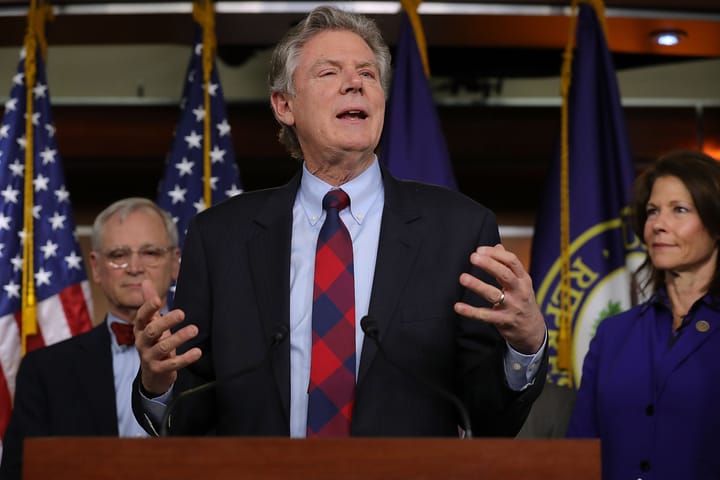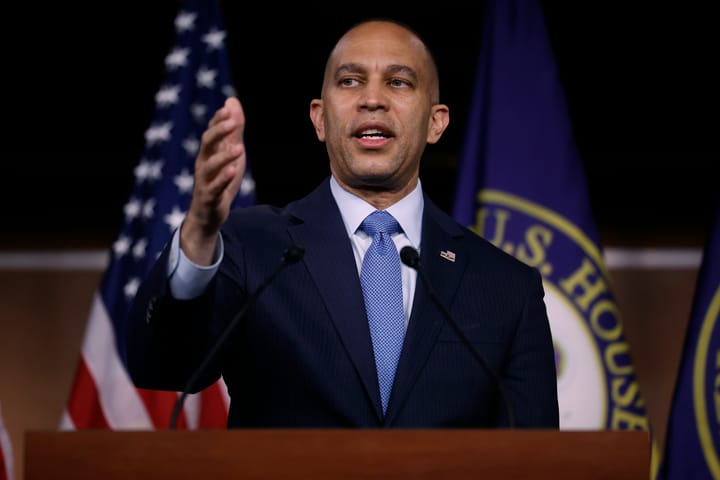Amid the mounting climate emergency, the House Democrat who chairs the committee overseeing energy policy benefits from investments in large U.S. greenhouse gas polluters. Environmental activists nationally and in his home state have pressured him to back stronger regulations on emissions.
Fourteen-term Rep. Frank Pallone of New Jersey, who became chair of the House Energy and Commerce Committee in 2019, will serve a crucial role in shaping legislation to achieve cuts in greenhouse gas emissions sought by the Biden administration and House Democrats. His committee’s jurisdiction includes “environmental protection” and “clean air and climate change.” In shepherding legislation on climate policies, it serves as the counterpart to the Senate Committee on Energy and Natural Resources, headed up by fossil fuel-friendly Joe Manchin of West Virginia, who has made millions in outside income from a family coal business while working to slow limits on emissions. Pallone’s committee will decide which climate measures advance to a full House vote in this Congress.
Last week was the deadline for Pallone’s office to release his annual financial disclosure for 2020, and the report shows that his spouse continues to hold stock in companies that play an active role in lobbying against strong climate policy: up to $15,000 worth in Chevron; up to $15,000 worth in electric utility Dominion Energy; and up to $30,000 worth in General Electric, the conglomerate that owns subsidiaries in the oil industry. Pallone’s spouse, Sarah Hospodor, first acquired the Chevron and Dominion stocks in 2012 and has pocketed capital gains of up to $1,000 each year since from each of the companies. She has held the GE stock since at least 2007, the first year for which Pallone’s financial disclosures are available. Hospodor occasionally sells portions of her GE stock holdings.
After Democrats won the 2018 midterms, as he was set to ascend to his perch on the Energy Committee, Pallone rejected the calls of Sunrise Movement activists to sign the No Fossil Fuel Money pledge eschewing campaign contributions over $200 from companies, lobbyists, and executives in the fossil fuel industry, telling them “no” repeatedly to their faces, according to Sunrise Movement co-founder Varshini Prakash. Last cycle, Pallone brought in nearly $300,000 from energy company PACs, a haul that has been steadily rising since he became the ranking member in 2014 of the House committee that handles legislation on climate issues. His 2020 PAC donors include those associated with Chevron, TransCanada, Duke Energy, and dozens more heavily polluting companies. Last cycle, Pallone received the second-highest amount of all House Democrats in donations from the Energy and Natural Resources sector, according to OpenSecrets.
A recent International Energy Agency report found that in order for the world to be on track to reach net zero emissions by 2050 no new fossil fuel infrastructure can be permitted, while the sale of new gasoline-powered vehicles must be halted by 2035. Emissions from power plants must be zeroed out by 2035 as well, with renewables providing the majority of their power generation and any carbon emissions captured. As part of the report’s call for a huge contraction in fossil fuel use in the energy sector, coal and gas-powered plants must be shut down as soon as 2040 in favor of renewable sources. Contrary to the latest reports from the IEA and the United Nations Intergovernmental Panel on Climate Change (IPCC), the Biden administration has approved 2,000 drilling and fracking permits on federal lands and recently called for expanded oil production.
COUNTING FOSSIL GAS AS “CLEAN ENERGY”
In the previous Congress, Pallone made clear he does not support the Green New Deal framework, which calls for a 10-year national mobilization to achieve converting 100% of U.S. power demand to renewable, zero-emissions sources, among other investments in clean energy and frontline communities.
In March, Pallone and Energy Subcommittee chairs introduced their version of a major climate plan, the CLEAN Future Act, which proposes a Clean Electricity Standard (CES) that rises to 80% of consumer electricity by 2030 and 100% by 2035, toward net zero U.S. greenhouse gas emissions by 2050. The bill would provide credits for clean power sources, which it defines as those producing 0.82 tons of carbon dioxide or less per megawatt-hour of power, meaning that nearly any type of natural gas plant, which average 0.6 metric tons according to the nonpartisan think tank Niskanen Center, would at least initially be eligible for credits. According to the bill summary, after 2035, electricity suppliers that exceed the rising emissions limits could buy credits under a trading program to reach compliance.
Chevron is a member of the powerhouse lobbying group American Petroleum Institute (API), which spent decades fighting environmental initiatives and stalling climate regulations behind the scenes. API’s response to the IEA report in May simply insisted on the continued use of oil and fossil gas. In partial disclosures earlier this year prompted by climate activists, Chevron disclosed membership in the American Fuel & Petrochemical Manufacturers (AFPM), which claimed not to have a position on the climate goals of the Paris Agreement of Dec. 2015, as well as the California Independent Petroleum Association (CIPA) and other groups that lobby against enforcement of climate measures.
Dominion Energy is a member of the trade group Edison Electric Institute, which has been pushing to keep a role for natural gas in Democrats’ energy plans. In May 2019, over a dozen large environmental groups including Oil Change International and 350.org put out findings that the continued use of gas would tip global emissions over levels set in the Paris Accord. Last year, as the CLEAN Future Act was being previewed, the groups Friends of the Earth and Food & Water Action called for Pallone’s bill to commit to a ban on fracking, as well as on exports and imports of fossil fuels. Dominion is the tenth biggest greenhouse gas polluter in the U.S., according to a 2020 study by the Political Economy Research Institute (PERI) at UMass Amherst.
According to the UK research group InfluenceMap, General Electric’s “Future of Energy” white paper from 2020 promoted continued use of fossil gas in the energy mix without mentioning adequate regulations to reduce its methane emissions. The company owns Baker Hughes, one of the biggest oil field services companies in the world, as well as GE Gas Power, which makes turbines for industries including oil and gas, cement, and data centers. It was the seventh largest toxic air polluter in PERI’s 2020 study.
Last month, Pallone was called out by New Jersey activists in rallies outside his district offices. “In light of the revelation of how Exxon lobbies Congress to ensure that no legislation will adequately address climate change, we now see why Frank Pallone’s CLEAN Future Act does nothing to ban fracking or new fossil fuel infrastructure,” said Joan Farkas, chair of Our Revolution Monmouth County.
Comparing the timelines in his CLEAN Future Act, which has 20 House cosponsors, and the Green New Deal, which has 102 House cosponsors, Pallone told NJ.com in February, “If I can move it up to 2030 and get the votes to do it, obviously I would. It’s an issue of what we can do.”
In the 2020 cycle, Pallone received the fifth-highest amount of PAC contributions among House Democrats, according to OpenSecrets. Chairs of congressional committees frequently put corporate PAC contributions toward paying party dues for powerful leadership positions.
Sludge inquired with Pallone’s House office if the congressman saw any potential conflicts in his household holding fossil fuel stock while playing a major role in setting emissions deadlines, and did not receive a response. Sludge also inquired on Pallone’s position on two bipartisan bills that would restrict individual stock ownership and transactions by members of Congress—Rep. Krishnamoorthi’s H.R. 1579, the Ban Conflicted Trading Act, with 20 cosponsors, and Rep. Spanberger’s H.R. 336, the TRUST in Congress Act, with 15 cosponsors—and did not receive a response.
Originally published at The Brick House Cooperative.



